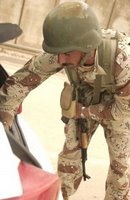B36 News - 17 July 2006
Here's today's good news from 'downrange'.
 This Guy's Got My Back
This Guy's Got My Back
The Iraqi Army Soldier pictured here is one of the many troops that stands guard at one of the many entry control points to the International Zone. These are the guys who prevent badguys from getting into the IZ and blowing us up. It's troops like him that allow me to sleep soundly at night.
Soldiers attacked insurgents who they thought were preparing to dump a body. True to form, the bad guys ran away and left their 'corpse' for the good guys. As it turned out the corpse was actually a reporter from the Voice of America. I wonder if we'll hear about this from VoA.
Quick Thinking Interpreter
Man, this interpreter deserves a medal or something. Check this out, after a brief firefight:
A couple days ago I posted a story about a Soldier who got shot in the head and survived. Here's another story about a Marine who did the same.
As a leader of troops, please accept my heart-felt thanks for doing your part.
 This Guy's Got My Back
This Guy's Got My BackThe Iraqi Army Soldier pictured here is one of the many troops that stands guard at one of the many entry control points to the International Zone. These are the guys who prevent badguys from getting into the IZ and blowing us up. It's troops like him that allow me to sleep soundly at night.
Written by Staff Sgt. Kevin Lovel, 363rd MPADSoldiers Free Journalist
BAGHDAD - Working together as a cohesive team, Multi-National Division – Baghdad Soldiers, Iraqi army soldiers and private security company employees work at entry control checkpoints to provide safety and security for Baghdad’s “Green Zone.”
“Our mission is to provide safety for the local nationals (and IA and MND-B Soldiers). We try to keep terrorists out of the Green Zone. It’s pretty much a safe haven,” said Sgt. 1st Class Jesse Matthews, infantryman, 1st Battalion, 12th Infantry Regiment, 4th Brigade Combat Team, 4th Infantry Division, who works at an Entry Control Point near Forward Operating Base Prosperity side-by-side with his Iraqi counterparts.
“The main thing we do is to make sure people have proper identification and passports. We make sure they’re not bringing in suicide-vest improvised-explosive devices, vehicle-borne IEDs and weapons they’re not supposed to have,” said Matthews.
The MND-B Soldiers said one of the benefits of their jobs is the opportunity to interact with Iraqi citizens.
Spc. Sevillano Gonzalez, infantryman, 1st Bn., 12th Inf. Regt., 4th BCT, 4th Inf. Div., said he likes the fact that he “gets to see different faces and different attitudes. I get to know the Iraqi nationals more,” but acknowledges “every day is a stressful day.”
Gonzalez said his personal philosophy is to maintain a positive attitude despite the rigors of his job.
Soldiers attacked insurgents who they thought were preparing to dump a body. True to form, the bad guys ran away and left their 'corpse' for the good guys. As it turned out the corpse was actually a reporter from the Voice of America. I wonder if we'll hear about this from VoA.
Quick Thinking Interpreter
Man, this interpreter deserves a medal or something. Check this out, after a brief firefight:
Two dead terrorists were discovered near a ringing cell phone, officials said. An interpreter answered the phone and extracted the location of other suspects from an unidentified woman caller. Iraqi and U.S. soldiers later found a wounded terrorist. They provided first aid to the wounded man and requested a medical evacuation.Hard-headed Marine
A couple days ago I posted a story about a Soldier who got shot in the head and survived. Here's another story about a Marine who did the same.
Ladies and Gentlemen, I hope that stories like these help you realize just where your tax dollars are going. Every one of you who pays taxes in America contributed, small as it may be, to purchasing this troop's helmet and saving his life.“I was running back across the street after we had confirmed that the IED we responded to was in fact not one, when I heard the shot,” said Lance Cpl . Kelvin J. Grisales, fire team leader and friend of Linck.
A single shot cracked through the air. Everyone jolted and not even Linck, who was hit, knew what happened.
“After the shot rang out, I remember hearing someone screaming ‘Man down, Man down,” Linck said. “I realized a second later that man was me, I was on the ground.”
(full story by Cpl Brian Reimers, RCT-5 posted in comments)
As a leader of troops, please accept my heart-felt thanks for doing your part.




1 Comments:
By Cpl Brian Reimers
Regimental Combat Team 5
FALLUJAH, Iraq (May 7, 2006) - If anyone was proud to be labeled hard-headed, it’s Pfc. Fred M. Linck. The 19-year-old from Westbrook, Conn., took an enemy shot to the head and walked away with little more than a sore noggin and a white bandage.
Linck of 1st Battalion, 25th Marine Regiment, Regimental Combat Team 5, was struck by a single enemy bullet May 5.
“It seemed like just another day in the city of Fallujah,” Linck said, an infantryman assigned to C Company. “But everything changed for me that day.”
The young Marine just got off of a security post and was tasked to be part of a reaction force. The force was gearing up to respond to a call for help in the city.
“We got some intelligence stating that there was a possible improvised explosive device on the corner of the main street in Fallujah,” Linck said. “My team of Marines reacted to the call and showed up to the site. We immediately dismounted our vehicles and set up a cordon of the area.”
Some of the other men in the team didn’t want to believe that it was a normal mission for them, in fact they had planned on it being much more than that.
“Something told me that this was going to be a set up, a pretty usual tactic for the insurgents to use against us,” said Lance Cpl. Randon O. Hogen, a fellow infantrymen and member of Linck’s fire team.
Hogen’s gut instincts were right. Somewhere in the shadows of the concrete buildings, an insurgent was waiting for the Marines to come into his view.
“I was running back across the street after we had confirmed that the IED we responded to was in fact not one, when I heard the shot,” said Lance Cpl . Kelvin J. Grisales, fire team leader and friend of Linck.
A single shot cracked through the air. Everyone jolted and not even Linck, who was hit, knew what happened.
“After the shot rang out, I remember hearing someone screaming ‘Man down, Man down,” Linck said. “I realized a second later that man was me, I was on the ground.”
It took a couple seconds for everything to appear clear to Linck. The sounds of Marines calling for help weren’t for anyone but him, but he was ready to get up and fight.
“I was pretty scared when I realized that I had just taken a round to the head, but the scariest part was that I was thinking about it and I felt fine,” Linck said, who has only served with the battalion for a few months. “It felt as if I had fallen and hit my head, that’s it.”
The rest of his team did not know his status. They didn’t take chances and followed their training, evacuating him out of the area.
“When we picked him up, he grabbed my hand and told me that he was pretty nervous,” said 22-year-old Grisales, from Hartford, Conn. “All I could do was to try to reassure him that he would be alright, at the same time I was trying to do the same for myself.”
Linck was transferred directly from the battlefield to the nearest hospital where he was treated and released without even a stitch in his head.
The issued helmet he wore stopped the majority of the round from penetrating. A small piece of fragmentation from the round pierced through the headband inside of the helmet, causing a small laceration on his forehead.
“It was such a relief for us when we pulled up to the hospital and we found out that he was okay,” Grisales said.
“I thank God that it happened the way that it did,” Hogen added.
Linck doesn’t discount Divine intervention or luck, but trusts his gear more now than ever.
“I know for sure that if it wasn’t for that helmet, I wouldn’t be standing here right now,” Linck said. “It pays to wear all the gear the way it is supposed to be worn.”
“It is one thing to hear about what our gear is capable of, but this just makes it a reality,” Hogen said. “It did exactly what it was supposed to do.”
Linck has since returned to duty with a new outlook on life.
“It is kind of like a second lease of life,” he said. “I want to make sure I do everything right.”
Post a Comment
<< Home